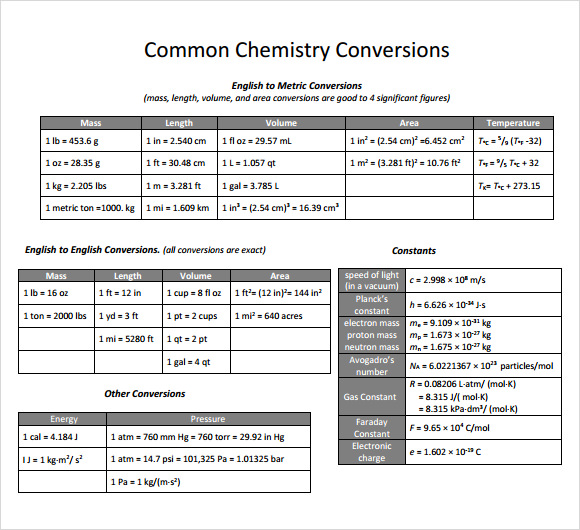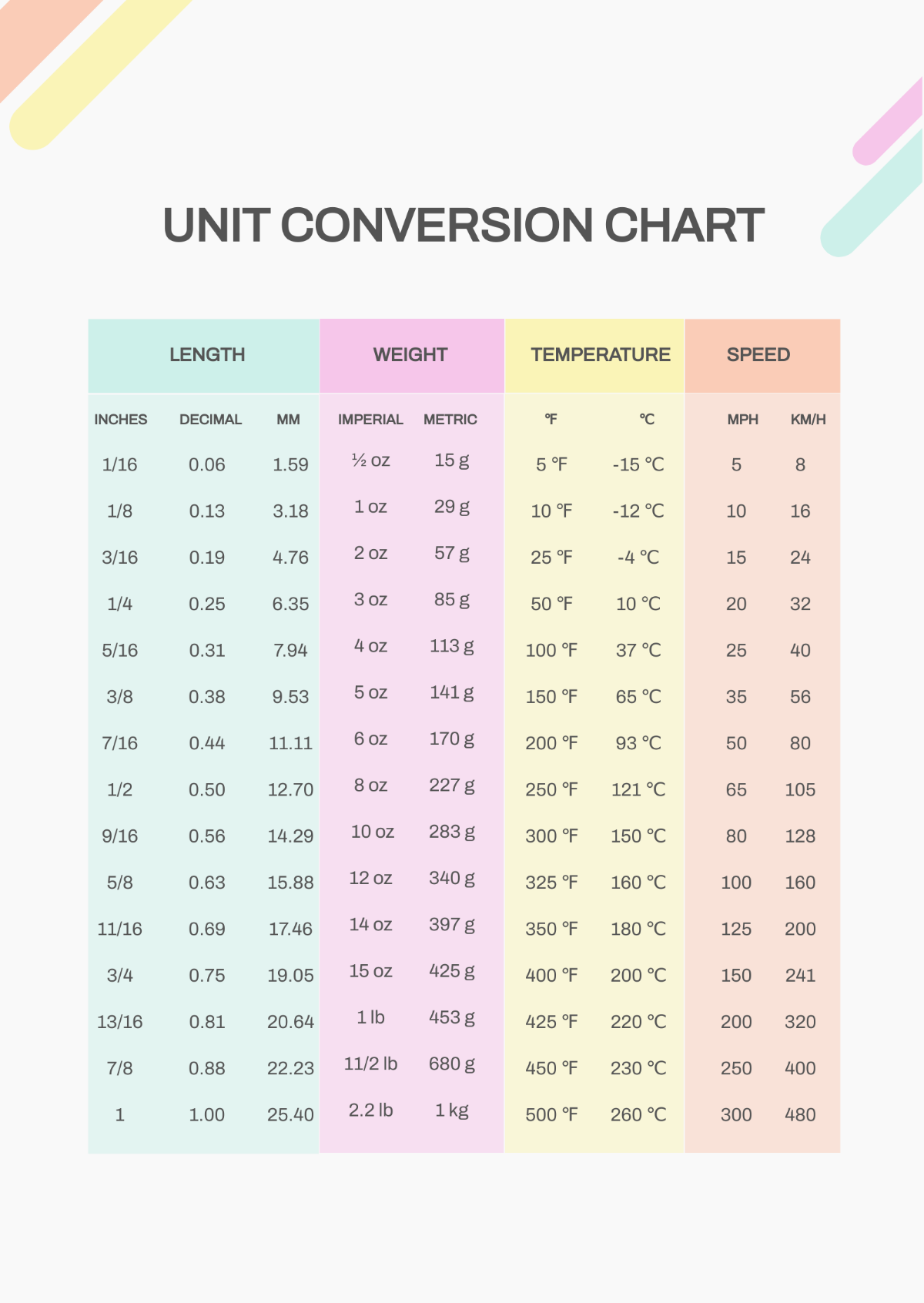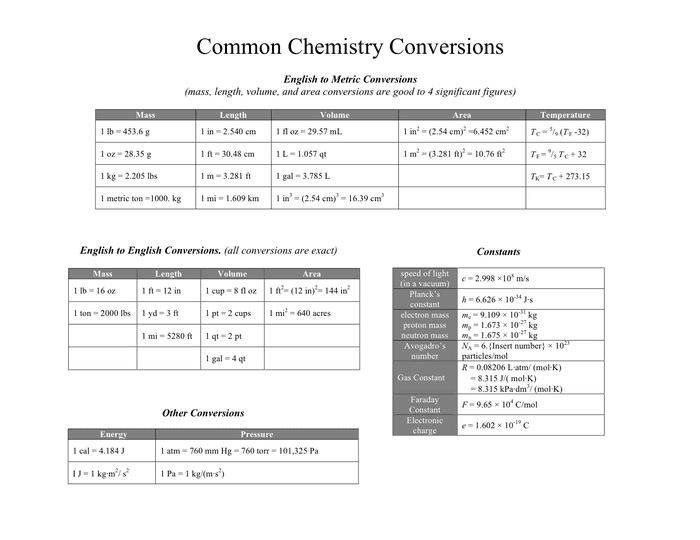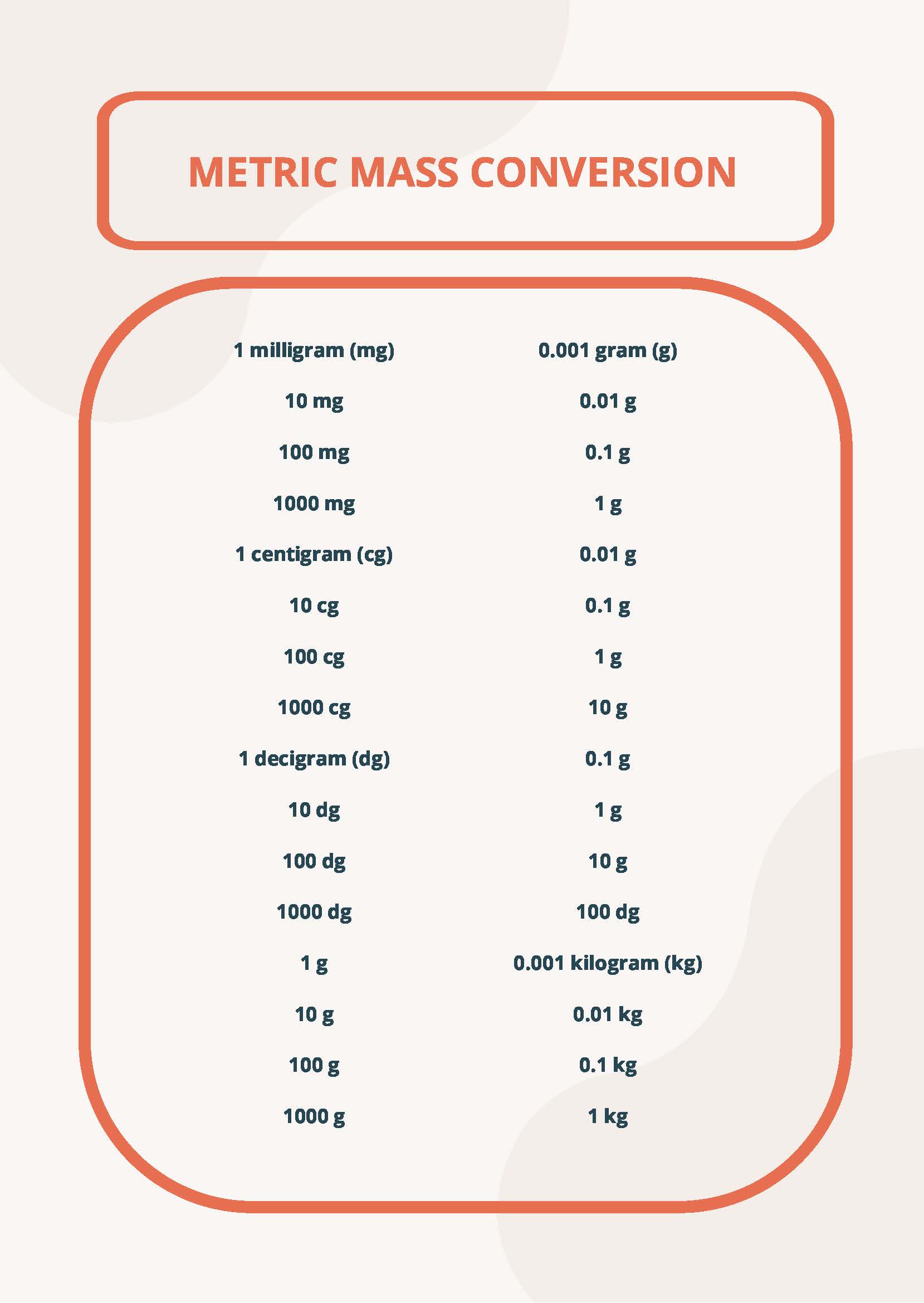Printable Chemistry Conversion Chart
Printable Chemistry Conversion Chart - Printable metric conversion charts and tables author: Mass length volume area temperature Metric conversion factors and other conversion factors and constants commonly used in chemistry Metric conversion factors and honours chemistry equations and constants in single cheat sheet Download this metric unit conversion chart chemistry design in pdf, illustrator format. The temperature conversions are exact. Measurement conversion chart for chemistry chemistry 2e paul flowers,richard langely,william r. Conversion tables all quantities (mass, length, density, speed, force, pressure, energy, power) listed in these conversion tables can be ultimately expressed in the following three basic units: 1 dekameter = 1000 centimeters or 1 kilometer = 10 hectometers. Units in the first column are generally not used in nist. Units in the first column are generally not used in nist. List the metric units without prefixes and the corresponding abbreviations for length (meter, m), mass (gram, g), volume (liter, l), and energy (joule, j). Quantities, units and symbols in physical chemistry international union of pure and applied chemistry. Metric conversion factors and honours chemistry equations and constants in single cheat sheet Metric conversion factors and other conversion factors and constants commonly used in chemistry Measurement conversion chart for chemistry chemistry 2e paul flowers,richard langely,william r. 1 dekameter = 1000 centimeters or 1 kilometer = 10 hectometers. Common chemistry conversions english to metric conversions (mass, length, volume, and area conversions are good to 4 significant figures) mass length volume area temperature 1 lb =. Download this metric unit conversion chart chemistry design in pdf, illustrator format. The mass, length, volume, and area conversions are given to 4 significant figures. Download this chemistry conversion chart design in pdf format. Units in the first column are generally not used in nist. 1.4) state the numbers or. 1 dekameter = 1000 centimeters or 1 kilometer = 10 hectometers. List the metric units without prefixes and the corresponding abbreviations for length (meter, m), mass (gram, g), volume (liter, l), and energy (joule, j). Printable metric conversion charts and tables author: 1.4) state the numbers or. Units in the first column are generally not used in nist. Metric conversion factors and honours chemistry equations and constants in single cheat sheet Metric conversion factors and other conversion factors and constants commonly used in chemistry Below is a table of conversion factors (source). Metric conversion factors and other conversion factors and constants commonly used in chemistry Download this chemistry conversion chart design in pdf format. Quantities, units and symbols in physical chemistry international union of pure and applied chemistry. The document provides a basic cheat sheet for converting between metric and other units of measurement. Common chemistry conversions english to metric conversions (mass, length, volume, and area conversions are good to 4 significant figures) mass length volume area temperature 1 lb =. Mass length volume area temperature Below is a table of conversion factors (source). Quantities, units and symbols in physical chemistry international union of pure and applied chemistry. Conversion tables all quantities (mass, length,. Metric conversion factors and honours chemistry equations and constants in single cheat sheet Common chemistry conversions english to metric conversions (mass, length, volume, and area conversions are good to 4 significant figures) mass length volume area temperature 1 lb =. The mass, length, volume, and area conversions are given to 4 significant figures. Printable metric conversion charts and tables author:. 1.4) state the numbers or. Download this metric unit conversion chart chemistry design in pdf, illustrator format. Metric conversion factors and other conversion factors and constants commonly used in chemistry Conversion tables all quantities (mass, length, density, speed, force, pressure, energy, power) listed in these conversion tables can be ultimately expressed in the following three basic units: Chemistry 2e paul. This quick math review outlines the basic rules (left) and chemistry applications (right) of each term. Metric conversion factors and honours chemistry equations and constants in single cheat sheet Common chemistry conversions english to metric conversions (mass, length, volume, and area conversions are good to 4 significant figures) mass length volume area temperature 1 lb =. It lists the metric. Units in the first column are generally not used in nist. Metric conversion factors and honours chemistry equations and constants in single cheat sheet Metric conversion factors and other conversion factors and constants commonly used in chemistry Measurement conversion chart for chemistry chemistry 2e paul flowers,richard langely,william r. Chemistry 2e paul flowers,richard langely,william r. Download this chemistry conversion chart design in pdf format. 1 dekameter = 1000 centimeters or 1 kilometer = 10 hectometers. Download this metric unit conversion chart chemistry design in pdf, illustrator format. This quick math review outlines the basic rules (left) and chemistry applications (right) of each term. Units in the first column are generally not used in nist. Mass length volume area temperature Bold values indicate exact conversion values. Quantities, units and symbols in physical chemistry international union of pure and applied chemistry. List the metric units without prefixes and the corresponding abbreviations for length (meter, m), mass (gram, g), volume (liter, l), and energy (joule, j). Metric conversion factors and honours chemistry equations and constants in single. Units in the first column are generally not used in nist. 1.4) state the numbers or. Printable metric conversion charts and tables author: Common chemistry conversions english to metric conversions (mass, length, volume, and area conversions are good to 4 significant figures) mass length volume area temperature 1 lb =. Below is a table of conversion factors (source). List the metric units without prefixes and the corresponding abbreviations for length (meter, m), mass (gram, g), volume (liter, l), and energy (joule, j). Quantities, units and symbols in physical chemistry international union of pure and applied chemistry. Bold values indicate exact conversion values. Download this metric unit conversion chart chemistry design in pdf, illustrator format. Mass length volume area temperature Metric conversion factors and honours chemistry equations and constants in single cheat sheet Conversion tables all quantities (mass, length, density, speed, force, pressure, energy, power) listed in these conversion tables can be ultimately expressed in the following three basic units: Metric conversion factors and other conversion factors and constants commonly used in chemistry 1 dekameter = 1000 centimeters or 1 kilometer = 10 hectometers. This quick math review outlines the basic rules (left) and chemistry applications (right) of each term. When converting, assign the unit to the right a value of 1 and add a zero each unit you move to the left.Printable Chemistry Conversion Chart
conversion chart unit Printable chemistry conversion chart
Common Chemistry Conversions Chart
Chemistry Conversion Chart Printable
Chemistry Conversion Factor Chart Conversion Chemistry Facto
Printable Chemistry Conversion Chart
Metric System Conversion Table Free Printable
Chemistry Conversions Cheat Sheet Printable Templates Free
Conversion Chart For Chemistry Measurements Printable Metric
Organic Chemistry Conversion Chart
American Linear Units American To Metric Units American Capacity 12 Inches (In) 1 Foot (Ft) 1 Inch 2.540 Centimeters 8 Fluid Ounces (Fl Oz) 1 Cup
The Mass, Length, Volume, And Area Conversions Are Given To 4 Significant Figures.
The Document Provides A Basic Cheat Sheet For Converting Between Metric And Other Units Of Measurement.
The Temperature Conversions Are Exact.
Related Post:









